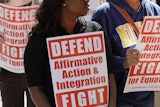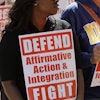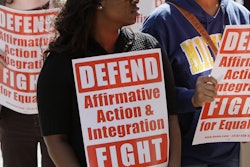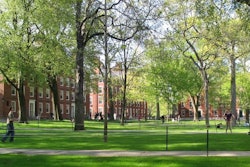Scholars Gear Up to Defend School Desegregation
By Christina Asquith
As the U.S. Supreme Court prepares to hear two school desegregation cases, a group of more than 600 organizations, legal experts and education scholars are filing briefs supporting what the NAACP calls “voluntary integration efforts.”
“What is at issue is this country’s promise made 52 years ago in Brown v. Board of Education and how much is left of that promise,” says Theodore M. Shaw, president and director-counsel of the NAACP Legal Defense and Educational Fund.
The Supreme Court will begin hearing oral arguments on Dec. 4 in cases brought on by parent groups in Seattle and Louisville, Ky. In both cases, local education officials designed enrollment plans that encouraged racial diversity while allowing children to attend neighborhood schools and have some measure of school choice. These efforts were challenged by parent groups, who filed lawsuits claiming that the consideration of race was a violation of the Equal Protection Clause of the 14th Amendment.
The school districts have won in federal, district and appellate courts. However, the Supreme Court agreed to review the issue on appeal. U.S. Secretary of Education Margaret Spellings has weighed in against using race in admissions, as have officials from the U.S. Department of Justice, arguing that the school districts’ efforts are unconstitutional.
With Justice Sandra Day O’Connor’s retirement and President Bush’s appointment of conservative justices John Roberts and Samuel Alito, it is uncertain how the court will rule.
Research by Dr. Gary Orfield, director of the Civil Rights Project at Harvard University, shows that segregated schools tend to be unequal in many respects: They have higher concentrations of poverty, higher turnover among teachers, fewer well-qualified teachers and fewer Advanced Placement courses.
“We’re amazed. People should realize there’s a vast body of scientific evidence supporting desegregation,” he says.
Orfield says there’s been a growth of residentially segregated areas, especially for Hispanics, as a result of the changing population in the United States.
“There’s been a dismantling of desegregation orders that were successful in the South,” he says.
The Seattle case involves the school district’s “racial tiebreaker” policy, which was suspended in 2002. Seattle schools have an “open choice” policy that allows students to attend any school. Race was allowed to be used as one criterion for admission when demand for a specific school outpaced capacity. After White children were denied admission in favor of minority students who lived further away, angry parents argued that considering race is a violation of the federal Civil Rights Act of 1964 and Initiative 200, a state law forbidding preferential treatment on the basis of race, ethnicity or gender.
In Louisville, parent Crystal Meredith claims the district’s policy denied her son, Joshua, a transfer to a better school because he is White.
Francisco Negron, general counsel for the National School Board Association, says the case is about allowing local districts to decide for themselves what’s in the best interests of the students.
The LDF has launched a new section on its Web site in support of the two cases. Visit www.naacpldf. org for more details.
© Copyright 2005 by DiverseEducation.com















